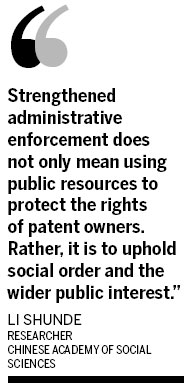Seminar: Cross-regional links to help fight fakes
Updated: 2013-05-15 05:31
By Zhang Zhao (China Daily)
|
||||||||
Government officials, scholars and entrepreneurs called for stronger cross-regional administrative enforcement to tackle "evolving patent-related disputes" during a seminar organized by China Intellectual Property News that opened on April 27.
Zhang Yuegeng, deputy editor-in-chief of the newspaper, said that most Chinese companies have sharply increased their intellectual property awareness in recent years, but they still suffer from infringement that "is becoming concealed and uses various means".
He noted that multiple regions are often involved in one case, which adds complexity because of difficulties in collecting evidence, longer investigation periods, higher costs and often low compensation.
Last year, 9,022 patent-related lawsuits were filed in China's courts, including 2,232 involving infringement, a 73.6 percent increase over 2011. Another 6,215 suits were filed over fake patents, 4,808 more than the year previous.
During the seminar representatives from companies called for enhanced enforcement and stronger penalties for infringement.
An executive at Shanghai Huapeng Explosion-Proof Technology Co outlined many years of patent infringement suffered by the industry leader.

Its vice-general manager Liu Zhongxiang said that copycats have gone through four steps over the years - directly using Huapeng's patents and trademarks, then using faked patent numbers and unauthorized patents in promotion and outright theft of Huapeng's innovative ideas to apply for patents.
"Because of the lack of transparency in administrative enforcement and a trusted information platform, there are many loopholes," Liu noted.
He cited the example of a case last year that grew out of a government-funded campaign to select 100 advanced safety technologies nationwide. A Beijing-based company was enrolled on the strength of having an invention patent as it claimed. But the patent had been denied due to a lack of originality.
"If such situations are not corrected, there is a potential safety hazard for society and people and it will bring shame on the government," Liu said.
Wang Dedao, director of the enforcement division at Beijing intellectual property office, said administrative enforcement offers convenience and higher efficiency than the court system in dealing with intellectual property disputes.
Last year Beijing established patent administrative enforcement partnership with nine provinces and cities, the first cross-regional cooperation of its kind in the nation.
Wang said the office is also using high-tech approaches including an online exchange platform for officials in various ministries or administrations to share information and transfer documents.
Li Shunde, a researcher and deputy-director of the intellectual property center at the Chinese Academy of Social Sciences, noted that "strengthened administrative enforcement does not only mean using public resources to protect the rights of patent owners".
"Rather, it is to uphold social order and the wider public interest," he said. "Patent infringement is not just a matter of intellectual property - it also damages the market order and the nation's economy."
He suggested that administrative enforcement focus on faked patents and repeated infringement.
But he added that cross-regional enforcement is "not only cooperation among patent authorities in different places".
"It should also involve other departments such as commerce, quality supervision and copyrights."
The joint enforcement model was also supported by Wang Hu, deputy-director of the legal affairs department at the Chongqing intellectual property office.
He said its advantage is that it allows authorities to use their specialties and experience to deal with a wide range of cases.
zhangzhao@chinadaily.com.cn
(China Daily 05/15/2013 page17)

 Michelle lays roses at site along Berlin Wall
Michelle lays roses at site along Berlin Wall
 Historic space lecture in Tiangong-1 commences
Historic space lecture in Tiangong-1 commences
 'Sopranos' Star James Gandolfini dead at 51
'Sopranos' Star James Gandolfini dead at 51
 UN: Number of refugees hits 18-year high
UN: Number of refugees hits 18-year high
 Slide: Jet exercises from aircraft carrier
Slide: Jet exercises from aircraft carrier
 Talks establish fishery hotline
Talks establish fishery hotline
 Foreign buyers eye Chinese drones
Foreign buyers eye Chinese drones
 UN chief hails China's peacekeepers
UN chief hails China's peacekeepers
Most Viewed
Editor's Picks

|

|

|

|

|

|
Today's Top News
Shenzhou X astronaut gives lecture today
US told to reassess duties on Chinese paper
Chinese seek greater share of satellite market
Russia rejects Obama's nuke cut proposal
US immigration bill sees Senate breakthrough
Brazilian cities revoke fare hikes
Moody's warns on China's local govt debt
Air quality in major cities drops in May
US Weekly

|

|







